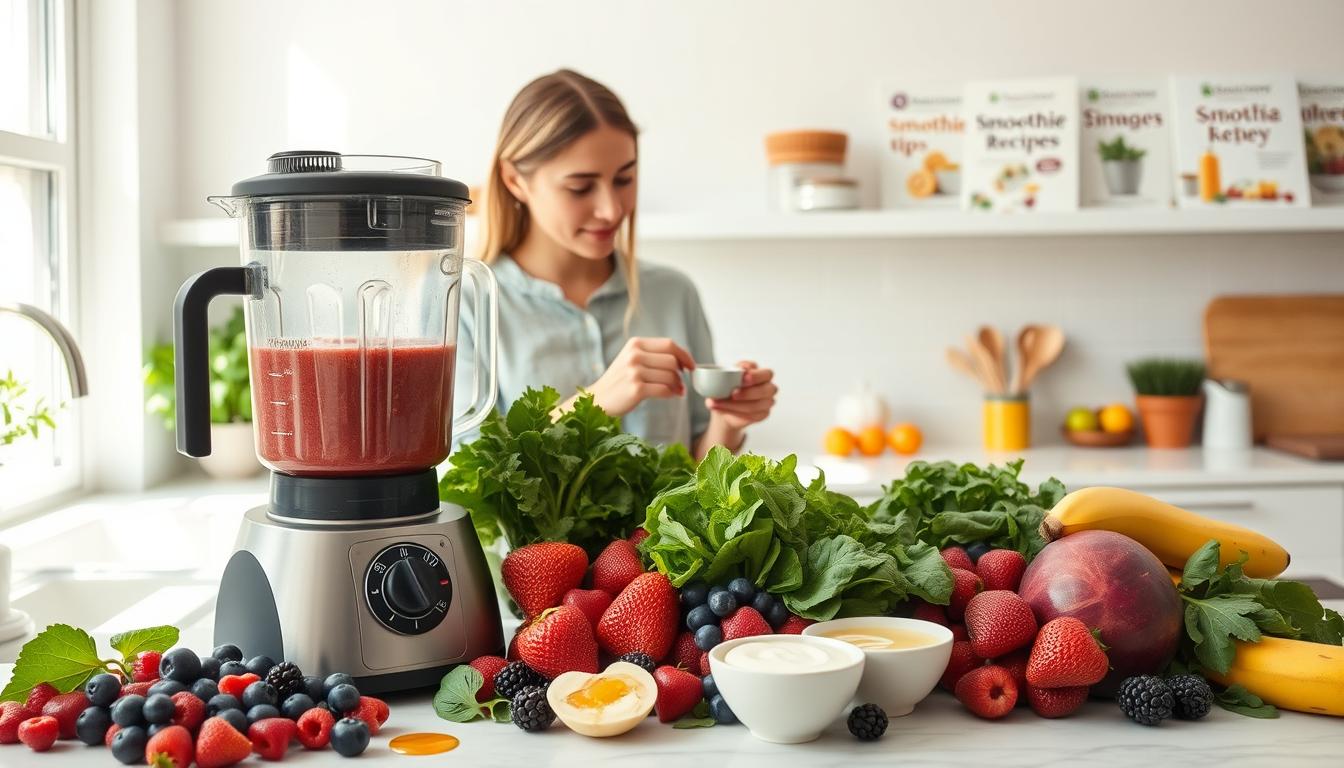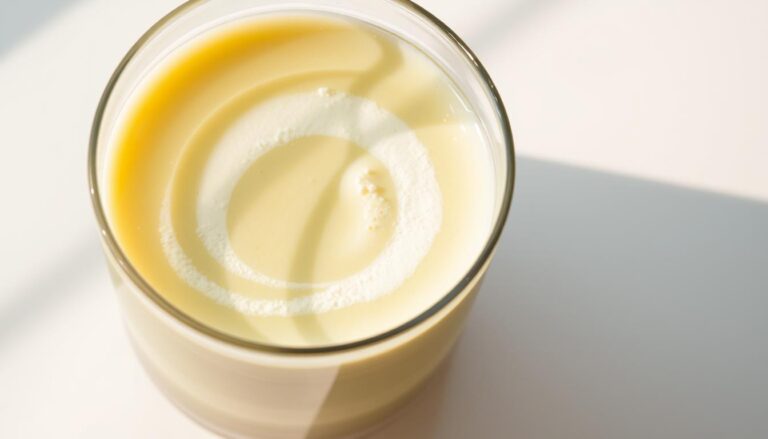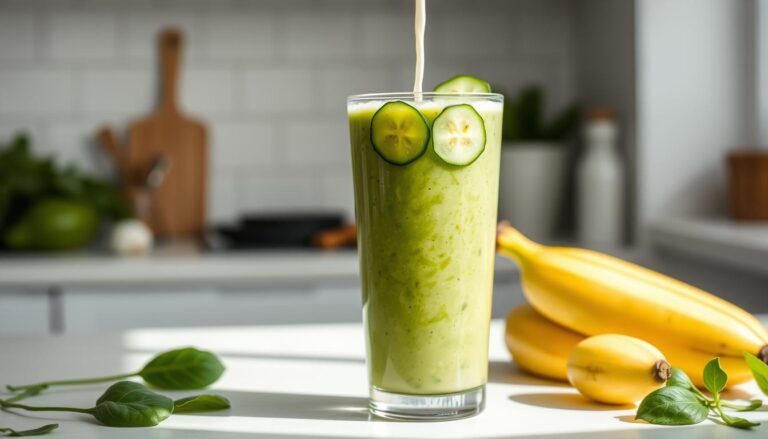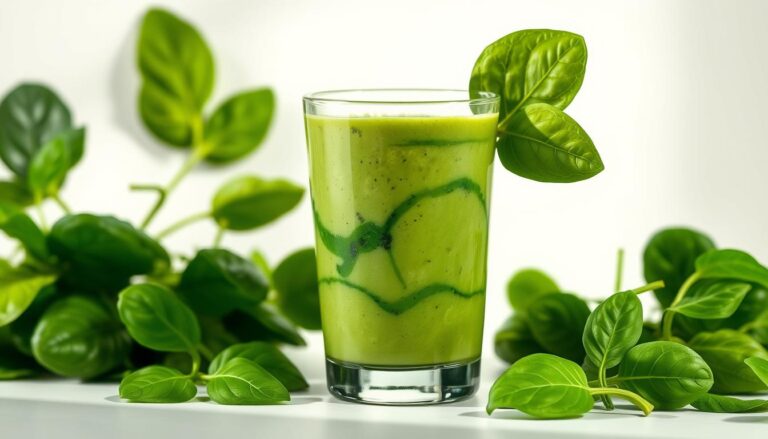Curious if you can get creamy, thick results when you skip bananas? This guide shows you how to make a smoothie without banana while keeping texture, flavor, and plant-based nutrition front and center.
Use frozen fruit and vegan thickeners like avocado, rolled oats, chia seeds, or frozen cauliflower rice for body that rivals bananas. Start by adding liquids first, then fresh ingredients, powders, frozen fruit, and ice.
High-powered blenders need about one minute. Standard blenders do best with two minutes and short pauses. Leftovers store in the fridge up to 24 hours or freeze as popsicles for up to three months.
Ready to personalize your blends? Try the free smoothie generator at https://healthconservatory.com/smoothie-generator and build recipes that fit your taste and goals any day.
Key Takeaways
- Banana-free blends can be just as creamy using avocado, oats, chia, or frozen cauliflower rice.
- Layer ingredients: liquids first, then fresh, powders, frozen, and ice.
- Blending time: ~1 minute for high-powered, ~2 minutes with pauses for standard blenders.
- Use frozen fruit for natural thickness and cost savings.
- Store smoothies up to 24 hours or freeze into popsicles for months.
How to Make a Smoothie Without Banana the smart vegan way, today
Start your morning with a simple plant-milk base and whatever fresh fruit you have. Pair almond, oat, soy, or cashew milk with frozen berries or ripe mango for instant body and chill.
Keep the recipe small and flexible so breakfast is fast. Add chia, hemp, or rolled oats for fiber and creaminess. Stir in a spoonful of almond or peanut butter for healthy fats and flavor.
Blend smart: begin on low, then increase speed. High-powered blenders finish near one minute; standard blenders take about two and may need a quick stir.
Use frozen fruit to thicken without watering down taste. Balance tart and sweet fruits, and brighten blends with citrus or ginger when you want zip.
- Quick formula: 1 cup plant milk + 1 cup fruit (fresh or frozen) + 1 tbsp seeds or nut butter.
- Swap sweeteners for dates or ripe mango for natural sugar.
- Personalize macros now with our smoothie generator: https://healthconservatory.com/smoothie-generator.
| Goal | Best swap | Why it works |
|---|---|---|
| Thick texture | Avocado or oats | Healthy fats or soluble fiber add body |
| Protein boost | Hemp or nut butter | Plant protein and satiety |
| Chill & sweeten | Frozen mango or dates | Natural sweetness without added sugar |
Vegan thickeners that replace banana without dairy
A few smart swaps deliver a rich, spoonable blend even when you skip banana. Use neutral, plant-based ingredients that build body, add protein, and keep flavor mild.
Staples you can use right away:
- Use half an avocado per 2 cups of smoothie base for a creamy smoothie that stays neutral in flavor.
- Add 1/2–3/4 cup frozen cauliflower rice to thicken blends; pair it with mango or pineapple to mask vegetal notes.
- Stir in 2–4 tablespoons rolled oats or 1–2 tablespoons chia seeds to absorb liquid and boost fiber and texture.
- Hemp seeds or ground flaxseed add creaminess and omega-3s; start with 1–2 tablespoons per serving.
- Almond butter, peanut, cashew, or pumpkin seed butter give body and protein; 1–2 tablespoons creates a silky mouthfeel.
- Choose coconut yogurt or other plant yogurt for dairy-free creaminess; if you prefer lighter blends, skip yogurt and use avocado or oats instead.
| Thickener | Use per 2 cups liquid | Best paired with |
|---|---|---|
| Avocado | 1/2 fruit | Mango, berries, cocoa |
| Frozen cauliflower rice | 1/2–3/4 cup | Tropical fruit (pineapple, mango) |
| Rolled oats / chia seeds | 2–4 tbsp / 1–2 tbsp | Berries, dates, cinnamon |
| Nut & seed butter | 1–2 tbsp | Banana-free cocoa or berry blends |
| Coconut or plant yogurt | 1/3–1/2 cup | Mild fruit, vanilla, protein blends |
Quick tips: Combine two thickeners—like oats plus avocado—when you want a spoonable bowl. Balance richer ingredients with bright fruit or a squeeze of citrus. If a recipe calls for greek yogurt, swap in thick coconut yogurt or increase oats and a splash more plant milk.
Fruit-first smoothie ideas without banana
Choose fruits that thicken when frozen and pair well with plant-based bases. This list focuses on vegan combos that give texture and bright flavor while keeping bananas out of the cup.
Strawberry + mango + coconut milk: Frozen strawberries and mango create tropical sweetness and natural creaminess. Use oat milk for a silkier finish.
Frozen peaches + pineapple + lime: Frozen peaches thicken the blend; pineapple adds juicy summer brightness. A squeeze of lime wakes up the flavor.
Blueberries + cherries + mixed berries: Frozen berries give a jammy body and colder sip. Add oats or hemp seeds for extra heft without dairy.
Watermelon + strawberry + mint: Hydrating and refreshing—add one tablespoon chia to prevent the texture from feeling too light.
- Try mango-pineapple-peach with frozen peaches for frostier results.
- Pair tart raspberries with sweet mango for tangy-sweet balance.
- For ultra-smooth blends, pick blueberries and strawberries or strain raspberry seeds.
Green smoothies you’ll actually crave
Bright, tropical flavors make leafy green blends easy to enjoy any morning. Pair sweet fruit with sturdy greens so your drink feels like dessert, not medicine. Keep the list short: greens, one fruit, a liquid, and a filler.
Kale, spinach, and leafy greens balanced with mango or pineapple
Balance kale or spinach with frozen mango or pineapple for a green smoothie that tastes bright and naturally sweet. Frozen mango adds body and chill without relying on banana. If kale seems sharp, start with baby spinach and increase greens slowly.
Hydrating greens: cucumber, celery, and herbs with citrus
Use cucumber and celery with mint or parsley plus lemon for a spa-fresh, hydrating blend. Coconut water gives light hydration; almond milk adds creaminess when you want more weight.
- Add 1 tbsp chia, hemp, or 2 tbsp oats per serving for staying power.
- Ginger or citrus zest lifts taste and cuts bitterness.
- Keep your ingredients list simple and taste, then tweak with extra frozen mango or a squeeze of lime.
| Base | Best fruit pair | Why it works |
|---|---|---|
| Spinach + almond milk | Frozen mango | Neutral greens + sweet body |
| Kale + coconut water | Pineapple | Tropical acidity masks bitter notes |
| Cucumber + coconut water | Orange or lemon | Hydrating, light, citrus brightens flavor |
Savory vegan smoothies for a not-too-sweet sip
Try a tomato-based blend when you want a savory sip that skips sweetness. Use garden ingredients and bold spices for a midday snack or light meal that still feels fresh.
Tomato, cauliflower, and spice-forward blends work like a veggie cocktail. Think tomato, cucumber, celery, and smoked paprika for a refreshing, savory drink.
- Add steamed or frozen cauliflower for body without adding sweetness.
- Boost protein and creaminess with hemp seeds or silken tofu while keeping the mix vegan.
- Use herbs like basil or cilantro and finish with apple cider vinegar for bright balance.
- Spice options—ginger plus turmeric or cumin with coriander—create depth of flavor.
- Start with low-sodium vegetable juice as part of the liquid for richer tomato notes.
Taste and adjust salt and acid at the end so the blend hits the right balance. These savory recipes fit when you want vegetables instead of fruits and a satisfying, low-sugar option.
| Base | Key ingredients | Why it works |
|---|---|---|
| Tomato + veg juice | Cucumber, celery, smoked paprika | Bright, savory body with fresh bite |
| Cauliflower + tomato | Frozen cauliflower, lemon, black pepper | Creamy texture without sweetness |
| Herb-forward | Basil or cilantro, apple cider vinegar, hemp | Fresh aroma, protein, bright acid |
Thicken smoothie without banana: techniques and ratios
Begin with 3/4 cup milk per serving and add thickeners in measured steps for reliable results. This gives you a consistent starting point for any vegan recipe and makes adjustments easy.
- Rolled oats: 2–4 tablespoons per cup of liquid for mild flavor and steady body.
- Chia seeds: 1 tablespoon per cup; blend, wait 2–3 minutes for gel, then re-blend if needed.
- Avocado: 1/4–1/2 fruit per serving for creamy mouthfeel and healthy fats.
Choose frozen fruit when you want a frostier, thicker smoothie blend. Use fresh fruit for brighter taste and a thinner sip. Pair frozen fruit with less ice to avoid dilution.
Quick blending and adjustment rules
Layer ingredients: liquids, leafy greens, powders, frozen fruit, then ice. High-powered blenders finish in about one minute. Standard blenders usually need about two minutes and short pauses.
“If the mix is too thin, add a handful of frozen fruit or 1 tablespoon oats; if too thick, add a splash of plant milk.”
| Goal | Action | Why it works |
|---|---|---|
| Thicker, spoonable | 2–4 tbsp oats per cup liquid | Oats absorb liquid and add soluble fiber |
| Gel body | 1 tbsp chia per cup, wait 2–3 min | Chia forms gel that thickens without flavor |
| Rich creaminess | 1/4–1/2 avocado per serving | Healthy fats create silky texture |
| Cold & thick | Frozen fruit + less ice | Frosty texture without watering down taste |
For leafy greens, blend them with milk first to break down fibers. Then add fruits and other ingredients for a smoother final texture.
Smoothie bowls without banana that still spoon thick
For a thick, breakfast-ready bowl, prioritize frozen mango, berries, or cherries over extra milk. Use minimal liquid so the mix stays scoopable and can hold toppings without collapsing.
Tropical, chocolate-cacao, and berry bowl bases
Tropical base: Frozen mango + pineapple with a splash of coconut milk and 1–2 tbsp oats for body.
Chocolate-cacao base: Blend cacao with frozen cherries or strawberries and a spoon of almond or peanut butter for richness.
Berry base: Frozen blueberries and raspberries give vivid color and natural thickness; add hemp or chia if you want more heft.
Crunchy toppings: granola, seeds, and fresh fruit
Top smart: Sprinkle granola, toasted coconut, chia, hemp, cacao nibs, or pumpkin seeds for crunch and nutrients.
- Keep liquids minimal—just enough to move the blades.
- Add 1–2 tbsp oats during blending so the bowl holds toppings well.
- Use a tamper with high-powered blenders to process thick mixes without adding more milk.
- Finish with a drizzle of date syrup or maple if you want a sweeter treat.
Try this recipe idea:frozen mango + coconut milk + 2 tbsp oats, blend until scoopable, then top with granola, sliced fruit, and seeds for a filling, vegan breakfast bowl.
Plant-based milks and yogurt swaps that work best
Pick your plant milk based on the texture you want and the fruit you plan to pair it with. This choice controls mouthfeel, sweetness, and how other ingredients blend.
Almond, oat, soy, coconut, and cashew notes
Almond milk is light and nutty and won’t overwhelm delicate fruits like peach or pear.
Oat milk gives extra body and a natural creaminess that works well in many recipe styles.
Soy milk is neutral and higher in protein, so use it for post-workout blends that need substance.
Coconut milk adds richness and a tropical flavor, ideal with mango or pineapple. Cashew milk feels ultra-smooth and pairs nicely with berries or cacao.
When to use coconut yogurt or skip yogurt entirely
Coconut yogurt or thick plant yogurt can boost creaminess; add 1/4–1/2 cup per serving if you want tang and body.
If you prefer lighter cups, or avoid fermented products, skip yogurt and thicken with oats, avocado, or chia.
For recipes calling for greek yogurt, swap in thick coconut yogurt or add 2–3 tablespoons extra oats plus a splash of milk.
| Base | Best use | Why it works |
|---|---|---|
| Almond milk | Delicate fruit blends | Light, slightly nutty; won’t mask flavor |
| Oat milk | Thicker, creamy recipe | Natural sweetness and body |
| Soy milk | Protein-forward blends | Neutral taste and higher protein |
| Coconut milk / yogurt | Tropical or spoonable bowls | Rich mouthfeel and tang from yogurt |
| Cashew milk | Berry & chocolate profiles | Silky texture that enhances richness |
Natural sweetness without the banana flavor
Small additions—like pitted dates or a spoon of nut butter—can transform mild fruit into a dessert-worthy drink.
Use whole, vegan-friendly sweeteners that add body and fiber rather than empty sugar. Start with softened dates for a caramel note and add ripe tropical produce for natural sugars and thickness.
Simple steps you can follow
- Soften pitted dates in warm water 5–10 minutes, then blend them for a rich, caramel flavor and extra fiber.
- Add 1–2 teaspoons maple syrup only when fruit isn’t very ripe or you want a dessert-like treat.
- Rely on ripe mango and pineapple for built-in sugar and body; frozen ripe pieces boost chill and texture.
- Stir in a spoonful of almond butter or cashew butter to round acidity and enhance perceived sweetness.
- Season with cinnamon or vanilla to amplify sweetness perception and cut added sweeteners.
Keep a squeeze of lemon or lime handy to lift flavor and stop the mix from feeling flat. If a cup gets too sweet, mellow it with cucumber, leafy greens, or extra plant milk.
| Sweetener | Use per serving | Best for |
|---|---|---|
| Dates (soaked) | 1–3 pieces | Caramel note, fiber, natural sugar |
| Ripe mango / pineapple | 1/2–1 cup (frozen) | Thickening and bright, tropical sweetness |
| Maple syrup | 1–2 tsp | Extra sweetness for dessert-leaning recipes |
| Nut butter (almond butter) | 1 tbsp | Rounds acidity, adds fat and creaminess |
“Sweeten thoughtfully so your cup stays a nourishing, everyday choice.”
Budget tips for smoothie lovers right now
Save money and flavor by buying fruit in season and freezing extras for later. Stock up when prices dip and freeze at peak ripeness so your blends taste bright all year.
Buy in season, freeze your own fruit, and bulk frozen options
Shop spring sales: strawberries can fall near $1 per pound versus $5 in winter. When you see a deal, buy more and freeze.
Warehouse clubs like Costco or Sam’s Club often have affordable frozen fruit that beats single-serve purchases. Co-ops and pick-your-own farms can cut costs for peaches, cherries, and berries.
Blending with what’s on hand: flexible, mix-and-match formulas
Use a simple formula: liquid + fruit + thickener + boost. That lets you swap ingredients based on what’s in the pantry and keeps breakfast or snack prep fast.
- Grow strawberries or raspberries in pots for seasonal savings.
- Freeze fruit on trays first to avoid clumps and portion easily for busy mornings.
- Keep a rotating stash of budget plant milks and seeds so you can assemble recipes any day.
- Batch-prep measured packs and use our smoothie generator for instant mix-and-match ideas.
| Tip | Why it helps | Quick action |
|---|---|---|
| Buy seasonal | Lower cost, better flavor | Freeze surplus |
| Warehouse frozen | Convenient, often cheaper | Compare per-pound price |
| Grow in pots | Long-term savings | Start with strawberries |
Blender setup and order of ingredients for the creamiest blend
Set up your pitcher so the blades meet liquid first; that simple step saves jams and speeds blending. Follow a reliable order and you’ll get a consistent, creamy smoothie every time.
Layering: liquids, fresh fruit, powders, frozen fruit, ice
Start with milk or another liquid. Add fresh fruit and leafy greens next so the blades catch soft items easily.
Sprinkle powders and seeds over the fresh layer to prevent clumping. Then place frozen fruit and ice on top.
Tip: Favor more frozen fruit and less ice for richer taste and better texture.
High-powered vs. standard blenders: timing and texture
Run high-powered machines from low to high; most reach silky texture in about 60 seconds.
With standard blenders, pulse, pause, and stir. Expect roughly two minutes total and short breaks so the mix cycles back to the blades.
- Use a tamper for thick blends and smoothie bowls so you can keep liquids minimal.
- If the motor stalls, add 1–2 tablespoons milk at a time to regain flow without thinning too much.
- Pre-soak oats or dates for a few minutes when you want ultra-creamy results.
- Clean the blender right away with warm water and a drop of soap to protect performance.
“Practice the same layering every time and your make smoothie routine becomes effortless.”
Mini listicle: five banana-free smoothie recipes to try today
These five quick recipes keep texture high and fuss low for everyday sipping. Each cup uses oats, seeds, avocado, or frozen fruit as thickening swaps so you stay banana-free and satisfied.
Creamy Mango Oat Smoothie
Ingredients: frozen mango, oat milk, 2–3 tbsp rolled oats, lime. Blend until silky. Great for breakfast.
Berry Kale Power Blend
Frozen blueberries and strawberries with a handful of kale, chia seeds or hemp, and almond milk make a bright, green-berry sip. Use less liquid for bowl consistency.
Peach Ginger Glow
Frozen peaches, fresh ginger, coconut milk, and optional maple syrup for warmth. Frozen peaches add chill and body without bananas.
Cherry Blueberry Hemp
Dark cherries, blueberries, 1–2 tbsp hemp seeds, and cashew milk blend into a protein-forward treat you can enjoy as a snack or breakfast.
Tomato Veggie Cocktail
Tomato, cucumber, celery, lemon, and spices make a savory cup that refreshes. Add frozen cauliflower or silken tofu for creaminess.
Blend time: ~1 minute in a high-powered blender or ~2 minutes in a standard one, pausing if needed. Want more custom combos? Try our smoothie generator: https://healthconservatory.com/smoothie-generator.
How to Make a Smoothie Without Banana for a protein boost
Boost the protein in your cup without bananas by layering seeds, nut butter, and a protein powder that suits your taste. Use these swaps when you want a filling, plant-based recipe that works for breakfast or after a workout.
Hemp, chia, nut butter, and powder strategies
Start with a protein-rich milk base like soy milk, then add whole-food boosters so your drink stays creamy and satisfying.
- Hemp seeds: 2 tablespoons give about 6–7 g protein and add a nutty, creamy texture.
- Chia seeds: 1 tablespoon for fiber and omega-3s; combine with hemp for balance.
- Nut butter: 1–2 tablespoons peanut or almond butter for fat, flavor, and extra protein.
- Vegan powder: Pick a clean powder (vanilla pairs well with berries and mango); add slowly — powders can thicken the mix.
For a vibrant green smoothie, blend spinach or kale with mango, hemp, and soy milk for both taste and staying power. Rotate seeds, butters, and powders through the week for variety and a broader nutrient profile.
| Protein source | Typical amount | Why it helps |
|---|---|---|
| Hemp seeds | 2 tbsp | 6–7 g protein, creamy texture |
| Chia seeds | 1 tbsp | Fiber, omega-3s, gentle gel |
| Nut butter | 1–2 tbsp | Healthy fats and extra protein |
“Adjust liquids gradually—protein additions change texture more than you expect.”
Seasonal spins for summer, fall, and beyond
Let seasonal stone fruit steer your recipe choices for peak taste and value. Choose fresh produce when it’s cheap and freeze extras for out-of-season cups.
Summer coolers: watermelon, pineapple mint, strawberry
Keep summer blends light and bright. Blend watermelon with strawberries and mint for a cooling sip. Add 1 tablespoon chia if you want more body without dairy.
Mix pineapple with fresh mint and coconut milk for a tropical cooler. Use mango or peaches when in season and freeze extras for later.
Cozy blends: pumpkin, chai spices, sweet potato
Switch to oat milk, pumpkin purée, and warm chai spices in fall for a comforting cup. Sweeten with dates and lift the taste with fresh ginger.
Mashed sweet potato with cinnamon and a touch of vanilla gives a nutrient-dense, dessert-like option you can enjoy any morning.
“Rotate cardamom, nutmeg, and clove to change one base into several distinct, cozy recipes.”
| Season | Key ingredients | Best texture boost |
|---|---|---|
| Summer | Watermelon, strawberry, mint | Chia or frozen peaches |
| Tropical | Pineapple, mango, coconut milk | Frozen mango or oats |
| Fall | Pumpkin, sweet potato, chai | Oat milk and dates |
| Winter | Dark berries, citrus zest | Frozen cauliflower or seeds |
Quick tips: Use less liquid for summer cups and more for thick, cozy blends. Keep oats and seeds stocked so you can adapt texture across seasons and save money year-round.
Storage, meal prep, and smoothie popsicles
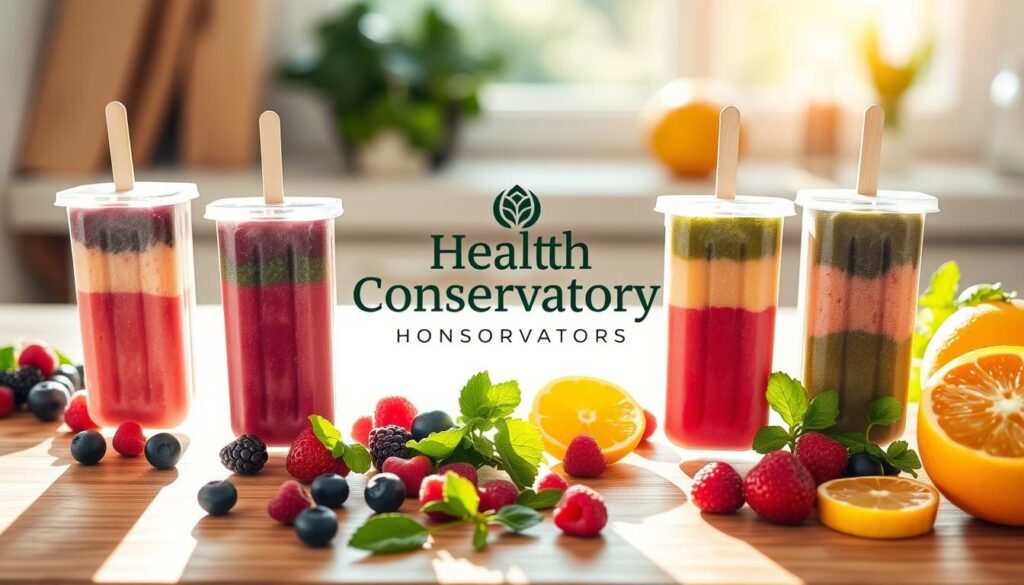
Turning extra cups into frozen snacks makes weekday breakfasts and desserts simple and healthy. Store single servings and plan packs so you have ready options every day.
Refrigeration windows and freeze-ahead cubes
Keep finished smoothies in airtight jars in the refrigerator for up to 24 hours. Shake or re-blend before serving for best texture.
Freeze leftovers in ice cube trays for starter cubes that speed morning blending. Add fresh fruits at the bottom of the pitcher and frozen pieces on top so your blender works with less effort.
Turn leftovers into pops for a healthy treat
Pour extras into popsicle molds and freeze for up to 3 months. Popsicles make a vegan-friendly, family-ready treat that often beats ice cream in nutrition.
- Label flavors and dates so you rotate stock and avoid freezer surprises.
- Portion fruit, greens, and thickeners into freezer packs; add plant milk or yogurt when you blend.
- If your blender struggles, thaw packs in the fridge 10–15 minutes before processing.
- Prep 3–5 jars on Sunday and finish each morning with a quick whirl for reliable breakfast options.
| Storage method | Duration | Best use |
|---|---|---|
| Airtight jar (fridge) | Up to 24 hours | Daily breakfast or quick snack; shake or re-blend |
| Ice cube trays | Up to 3 months (as starter cubes) | Speedy mornings; chill without extra ice |
| Popsicle molds | Up to 3 months | Family-friendly treats; healthy dessert alternative |
| Freezer packs (pre-measured) | 3 months | Meal prep: combine fruits, greens, thickeners; add milk/yogurt later |
“Popsicles are a healthy alternative to ice cream and a smart way to stretch extra ingredients.”
Build your perfect vegan smoothie blend now
Personalized blends remove guesswork and help you meet daily macros with plant-forward ingredients.
Use our smoothie generator for a tailored recipe that fits your taste and goals: https://healthconservatory.com/smoothie-generator.
Personalize flavors, macros, and texture
Choose your base — almond, oat, soy, coconut, or cashew milk — and the tool suggests cohesive flavor families.
- Pick the fruit you have and get thickener suggestions like oats, chia, avocado, or frozen cauliflower.
- Set your protein target and receive tailored boosts: hemp, nut butter, soy milk, or a vegan powder.
- Dial sweetness with dates, ripe mango, or pineapple while keeping sugar mindful.
- Get exact starting ratios and layering tips: liquid first, fresh, powders, frozen, then ice.
- Save favorites so your morning routine becomes automatic and quick each day.
- Explore options for green, fruit-first, savory, and bowl-style blends in one place.
Blend time guidance: about 1 minute in high-powered blenders or ~2 minutes with pauses for standard units. Iterate by swapping one ingredient at a time until your ideal cup appears.
Start now: https://healthconservatory.com/smoothie-generator — craft banana-free recipes that hit your protein and texture goals fast.
Conclusion
Finish with a simple reminder: small swaps and smart layering unlock rich, banana-free cups every day. Use oats, chia, avocado, or frozen cauliflower as thickeners and follow the liquid-first order for consistent texture. This recipe approach keeps your drinks creamy without relying on banana.
Whether you want a fruit smoothie, a bright green smoothie, or savory blends, you can skip the banana and still enjoy satisfying smoothies and even a banana smoothie-style mouthfeel. Store jars for 24 hours, freeze pops, and buy seasonal fruit to save money.
Keep experimenting: tweak one variable each time. For tailored ideas and exact ratios, visit our smoothie generator and make smoothie planning simple: https://healthconservatory.com/smoothie-generator.

